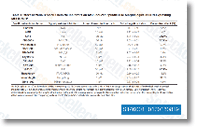We illustrated this shift in TGF signaling by using the human MCF10A breast cancer progression model that consists of indolent, malignant nonmetastatic, and malignant meta static cells. With this model system, we observed an enhanced capability of TGF to activate specifically p38 MAPK, but not Smad2, in a manner correlating with escalating metastatic potential. Importantly, the improved coupling of TGF to p38 MAPK activation in malig nant metastatic Ca1a cells correlated having a marked upregula tion of FAK expression as compared with their premetastatic counterparts. These findings are constant with all the notion that the acquisition of metastasis by breast cancer cells coincides with their elevated expression of FAK, which enhances p38 MAPK activation by TGF and its pro meta static activities.
To investigate the merits of this supposition, we compared the ability of manage and FAK deficient metastatic breast cancer cells to activate Smad23 and p38 MAPK in response to TGF. mTOR inhibitor therapy We located that FAK deficiency considerably not merely decreased basal p38 MAPK phosphorylation, but in addition com pletely abrogated the capability of TGF to activate p38 MAPK. Interestingly, in contrast to what we observed in NMuMG cells, the coupling of TGF to each Smad2 and Smad3 have been also decreased in FAK defi cient 4T1 cells. These information strain the elevated dependence of metastatic breast cancer cells on FAK to facilitate not just noncanonical, but in addition canonical TGF signaling. Previously, we established Src as getting vital for the potential of TGF to stimulate p38 MAPK in MECs.
To investigate the role of FAK in this mechanism, we now analyzed the phos phorylation and activation more helpful hints status of Src in handle and FAK depleted cells, which showed that FAK deficiency rendered Src hypophosphorylated in 4T1 cells. Collectively, these findings would be the 1st to demonstrate the rising dependence of metastatic breast cancer cells around the reciprocal activation involving FAK and Src in mediating downstream TGF signaling. FAK expression and kinase activity are needed for the aberrant formation of 3 integrinTR II signaling complexes We subsequent sought to address the mechanism by which FAK facil itates oncogenic TGF signaling. Previously, we observed 3 integrin to interact aberrantly with TR II, resulting within the promotion of MAPK signaling by TGF.
Indeed, robust quantities of FAK have been  detected in three integrinTR II complexes especially in NMuMG cells engineered to overex press three integrin. Furthermore, the formation of 3 integrinTR II complexes was readily induced in NMuMG cells subsequent to their induction of EMT by TGF. Nevertheless, this similar TGF therapy proto col failed to induce three integrinTR II interaction in FAK depleted NMuMG cells, as 3 integrin immunocomplexes isolated from FAK deficient NMuMG cells no longer integrated TR II, and TR II immunocomplexes no longer incorporated three integrin.
detected in three integrinTR II complexes especially in NMuMG cells engineered to overex press three integrin. Furthermore, the formation of 3 integrinTR II complexes was readily induced in NMuMG cells subsequent to their induction of EMT by TGF. Nevertheless, this similar TGF therapy proto col failed to induce three integrinTR II interaction in FAK depleted NMuMG cells, as 3 integrin immunocomplexes isolated from FAK deficient NMuMG cells no longer integrated TR II, and TR II immunocomplexes no longer incorporated three integrin.
No related posts.
